We’ll begin by surveying what 1 Corinthians tells us about the end times. Then we’ll consider why Paul spent so much time in chapter fifteen making a case for the resurrection of the saints when Christ returns. By examining tomb inscriptions and literary sources you’ll learn about the four major options for the afterlife in the Greco-Roman world: (1) non-existence, (2) ascension to the stars, (3) the Hades myth, and (4) reincarnation. My hope is you’ll come to see how radical and fresh the Judaeo-Christian idea of resurrection was to the people of Corinth and understand why Paul felt the need to expend so much effort convincing them of it.
Scriptures covered: 1 Corinthians 1:7-8; 3:12-13; 4:5; 5:5; 6:2-3, 9-10, 14; 11:26; 15:3-8, 12-14, 20-28, 35, 58; 16:22
![]() Listen on Spotify
Listen on Spotify
![]() Listen on Apple Podcasts
Listen on Apple Podcasts
—— Links ——
- See all the episodes in this class: 1 Corinthians in Context
- Check out Sean’s other classes here
- Get the transcript of this episode
- Support Restitutio by donating here
- Join our Restitutio Facebook Group and follow Sean Finnegan on Twitter @RestitutioSF
- Leave a voice message via SpeakPipe with questions or comments and we may play them out on the air
- Intro music: Good Vibes by MBB Attribution-ShareAlike 3.0 Unported (CC BY-SA 3.0) Free Download / Stream: Music promoted by Audio Library.
- Who is Sean Finnegan? Read his bio here
- Get Finnegan’s book, Kingdom Journey to learn about God’s kingdom coming on earth as well as the story of how Christianity lost this pearl of great price.

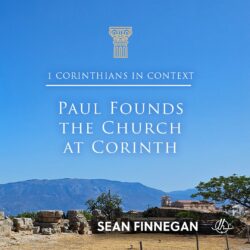
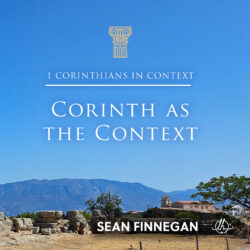
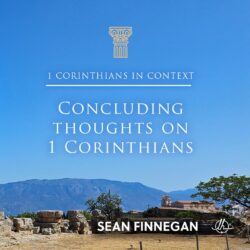
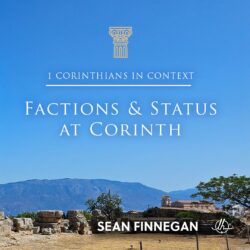
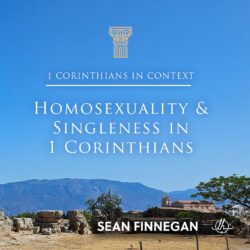
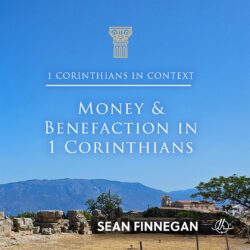
Thanks, Sean, for the wild journey through the afterlife beliefs of the early Greco-Roman folks. When you, as an aside, mentioned “rest in peace” (RIP), it struck me how biblically accurate that sounded. Then … I asked Google what the background was about that. Here’s what I got:
“The phrase ‘Rest in Peace” (often abbreviated as R.I.P.) originates from the Latin phrase Requiescat in pace, meaning ‘may he/she rest in peace.’ It was first used on Christian gravestones around the 8th century. The phrase gained popularity and was commonly used in the 18th century, with gravestones frequently abbreviating the full phrase to simply R.I.P. Initially, the phrase was used to express a wish for the deceased to find peace in the afterlife. As it became more widespread, the meaning evolved to include the physical body, with people wishing it to rest in peace in the grave until the soul and body were reunited.”
So … even here we see Christians straying away from biblical truth, which was so clearly presented in the OT, with numerous verses that spoke of a person going to “sleep with their forefathers” and finding rest in death (Job, Ecclesiastes). How they thought the body was actually “resting” until their supposed immortal soul, which was assumed to be hanging out in heaven, naked or bodiless, with Jesus for a time, would be reunited with said body is a mystery! There is no actual “resurrection” from the “dead” if a person is seen as, essentially, never dying. Appreciate all the work you put into preparing these lessons!
An interesting exploration of afterlife eschatology based on tombstones and extra-biblical literary sources. If you are going outside of scripture for fodder … How about “the elephant in the room” of the millions of NDEs and OBEs people have reported across the millennia to this day. I have had my own, and personally know others who have also had similar types of experiences. Some I would count as demonic, and others of the Holy Spirit and Jesus.
However, for guardrails on this topic … I go with scripture … ALL scripture on the topic. Scripture very clearly reports a conscious intermediate state if you avoid filtering verses, put down preconceived biases, and avoid twisting context. The apostle Paul and martyr Stephen both give accounts in scripture lending support for disembodied conscious souls in an intermediate state. As does Jesus, Enoch, Moses, Samuel, Mark, Luke, John, Matthew, Peter, King David, James, Ezekiel and Isaiah. The scriptures ALSO support a physical resurrection. A sound interpretation will encompass BOTH truths, fitting ALL of scripture, rather than faulty preconceived positions. “Soul sleep” is a false teaching. Scripture teaches the body sleeps AND STOPS THERE.
Sean’s “Hades myth” narrative is an interesting exploration but unfortunately does not cover the scriptural texts on Hades/Sheol/Tarturus/Paradise. I understand the enemy distorts all that he can, including understandings of the intermediate state and their locations … Hades, Tarturus, Paradise, Heaven … I fully support the Judeo-Christian version of Hades/Sheol/Paradise/Heaven as described in scripture.
Here are just some scriptures I found on Hades …
https://www.openbible.info/topics/hades
I don’t accept we get our original bodies back comprised of the same original atoms at resurrection. Illogical Non-sense! Jesus physical body was raised from the dead, obviously upgraded, and then he physically ascended to Heaven to be with His Father.
Scripture clearly signals our trajectory is different, in that our dead bodies either corrupt and decay to dust, or are cremated to ashes and then to dust. Then being resurrected at a much later date.